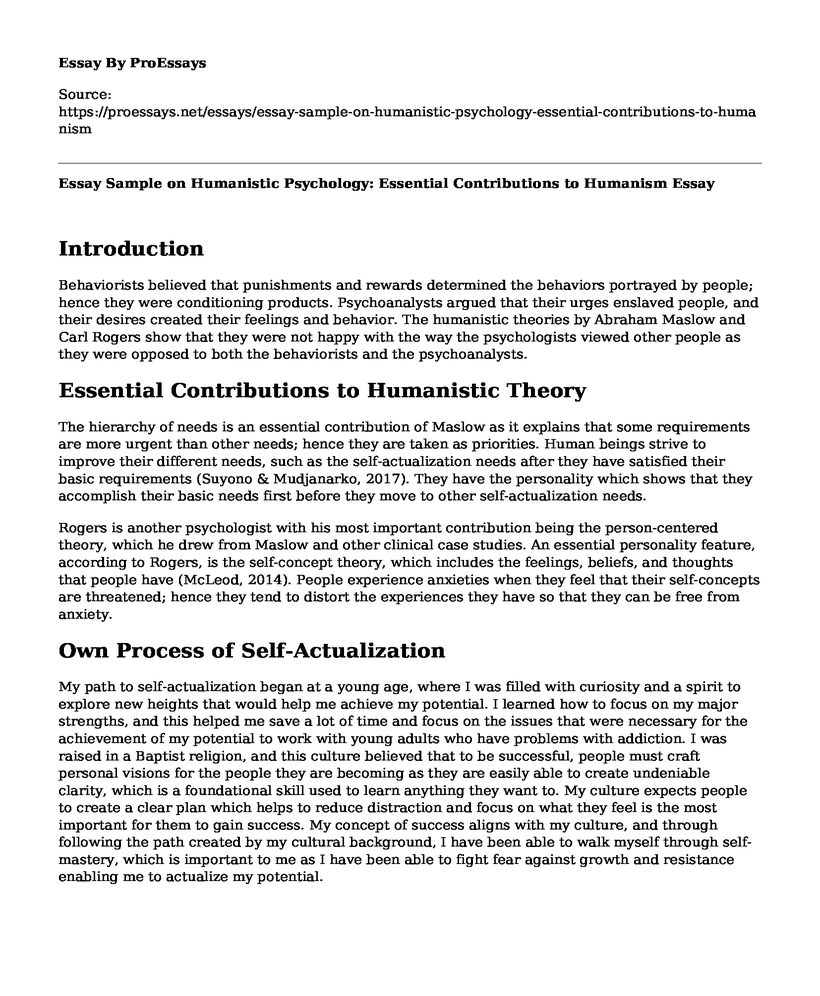Introduction
Behaviorists believed that punishments and rewards determined the behaviors portrayed by people; hence they were conditioning products. Psychoanalysts argued that their urges enslaved people, and their desires created their feelings and behavior. The humanistic theories by Abraham Maslow and Carl Rogers show that they were not happy with the way the psychologists viewed other people as they were opposed to both the behaviorists and the psychoanalysts.
Essential Contributions to Humanistic Theory
The hierarchy of needs is an essential contribution of Maslow as it explains that some requirements are more urgent than other needs; hence they are taken as priorities. Human beings strive to improve their different needs, such as the self-actualization needs after they have satisfied their basic requirements (Suyono & Mudjanarko, 2017). They have the personality which shows that they accomplish their basic needs first before they move to other self-actualization needs.
Rogers is another psychologist with his most important contribution being the person-centered theory, which he drew from Maslow and other clinical case studies. An essential personality feature, according to Rogers, is the self-concept theory, which includes the feelings, beliefs, and thoughts that people have (McLeod, 2014). People experience anxieties when they feel that their self-concepts are threatened; hence they tend to distort the experiences they have so that they can be free from anxiety.
Own Process of Self-Actualization
My path to self-actualization began at a young age, where I was filled with curiosity and a spirit to explore new heights that would help me achieve my potential. I learned how to focus on my major strengths, and this helped me save a lot of time and focus on the issues that were necessary for the achievement of my potential to work with young adults who have problems with addiction. I was raised in a Baptist religion, and this culture believed that to be successful, people must craft personal visions for the people they are becoming as they are easily able to create undeniable clarity, which is a foundational skill used to learn anything they want to. My culture expects people to create a clear plan which helps to reduce distraction and focus on what they feel is the most important for them to gain success. My concept of success aligns with my culture, and through following the path created by my cultural background, I have been able to walk myself through self-mastery, which is important to me as I have been able to fight fear against growth and resistance enabling me to actualize my potential.
Katherine's Case
Humanistic psychology perspectives are evident in Katherine's case, where she was faced with the urge to possess creativity and self-actualization so that she could achieve her potential. At the tenth anniversary, when she faced divorce and was jobless, making her gain weight; hence she did not feel any fulfillment as she was afraid that her former classmates would make fun of her. She also wanted to fulfill her hierarchy of needs first by ensuring that she had a job and a happy marriage first before she could go out and meet her friends (Suyono & Mudjanarko, 2017). This explains the reason why she waited for ten more years before she could finally agree to meet her classmates.
Maslow's hierarchy of needs applies in Katherine's case in the order of self-actualization, esteem, belonging, safety, and physiological needs. Self-actualization existed in the fact that she wanted to solve her problems first and accept the facts as they had occurred to her. She also had to gain confidence and increased self-esteem so that she could get respect from others (McLeod, 2014). In the case of belonging and safety in the list of needs, she needed to have a family first and feel safe about her body and her employment status.
References
McLeod, S. (2014). Carl Rogers. Retrieved 10 March 2020. https://www.simplypsychology.org/simplypsychology.org-carl-rogers.pdf
Suyono, J., & Mudjanarko, S. W. (2017). Motivation Engineering to Employee by Employees Abraham Maslow Theory. Journal of Education, 2(1), 86-92. https://pdfs.semanticscholar.org/1b27/50f5858ccf644064ea6c53242696deeef889.pdf
Cite this page
Essay Sample on Humanistic Psychology: Essential Contributions to Humanism. (2023, Apr 23). Retrieved from https://proessays.net/essays/essay-sample-on-humanistic-psychology-essential-contributions-to-humanism
If you are the original author of this essay and no longer wish to have it published on the ProEssays website, please click below to request its removal:
- Bullying and Suicide in Adolescents Essay
- Research Paper on Sociopathic Personalities
- When Photographs Create False Memories Essay
- Emotion Regulation Abilities in Young Children Paper Example
- Levels of Tuning-In Paper Example
- Paper Example on Mental Health and Social Issues
- Paper Example on Reasoning & Decision-Making: Exploring Chapter 12 of Galotti (2017)







